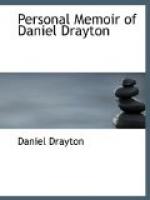kind of justice. You have heard the evidence;
the law for the purposes of this trial you are
to take from the judge. But you are not to
be led away with the idea that you must convict
this prisoner at any rate. It is a well-established
principle that it is better for an indefinite
number of guilty men to escape than for one innocent
man to be convicted and punished; and for the best
of reasons,—for to have the very machinery
established for the protection of right turned
into an instrument for the infliction of wrong,
strikes a more fatal blow at civil society than
any number of unpunished private injuries.
“Nor is there any danger that the prisoner will escape due punishment for any crimes he may have committed. Besides this and forty other larceny indictments hanging over his head, there are seventy-four transportation indictments against him. Now, he cannot be guilty of both; and which of these offences, if either, does the evidence against him prove?
“Who is this man? Look at him! You see he has passed the meridian of life. You have heard about him from his neighbors. They pronounce him a fair, upright, moral man. No suspicion hitherto was ever breathed against his honesty. He was a professor of religion, and, so far as we know, had walked in all the ordinances and commands of the law blameless. Now, in all cases of doubt, a fair and exemplary character, especially in an elderly man, is a great capital to begin with. This prisoner may have been mistaken in his views as to matters of human right; but, as to violating what he believed to be duty, there is not the slightest evidence that such was his character, but abundance to the contrary. He is found under circumstances that make him amenable to the law; let him be tried,—I do not gainsay that; but let him have the common sentiments of humanity extended toward him, even if he be guilty.
“The point urged against him with such earnestness—I may say vehemence—is, not that he took the slaves merely, but that he took them with design to steal. His confessions are dwelt upon, stated and overstated, as you will recollect. But consider under what circumstances these alleged confessions were made. There are circumstances which make such statements very fallacious. Consider his excitement—his state of health; for it is in evidence that he had been out of health, suffering with some disorder which required his head to be shaved. Consider the armed men that surrounded him, and the imminent peril in which he believed his life to be. It is great injustice to brand him with the foul epithet of liar for any little discrepancies, if such there were, in statements made under such circumstances. Other matters have been forced in, of a most extraordinary character, to prejudice his case in your eyes. It has been suggested—the idea has been thrown out, again and again—that, under pretence of helping them to freedom, he meant to sell these




